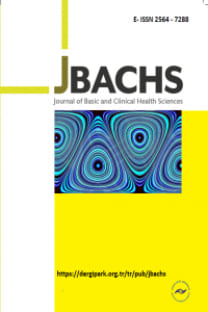Are Angiotensin II Receptor Blockers for Hypertension a Gleam of Hope or not Against COVID-19 Infection?
Are Angiotensin II Receptor Blockers for Hypertension a Gleam of Hope or not Against COVID-19 Infection?
___
- 1. Aydemir D, Ulusu NN. Is glucose-6-phosphate dehydrogenase enzyme deficiency a factor in Coronavirus-19 (COVID-19) infections and deaths? Pathog Glob Health 2020;114:109–110. [CrossRef]
- 2. Aydemir D, Ulusu NN. Correspondence: Angiotensin-converting enzyme 2 coated nanoparticles containing respiratory masks, chewing gums and nasal filters may be used for protection against COVID-19 infection. Travel Med Infect Dis 2020;101697. [CrossRef]
- 3. Singhal T. A Review of Coronavirus Disease-2019 (COVID-19). Indian J Pediatr 2020;87:281–286. [CrossRef]
- 4. Arendse LB, Danser AHJ, Poglitsch M, et al. Novel Therapeutic Approaches Targeting the Renin-Angiotensin System and Associated Peptides in Hypertension and Heart Failure. Pharmacol Rev 2019;71:539–570. [CrossRef]
- 5. Riordan JF. Angiotensin-I-converting enzyme and its relatives. Genome Biol 2003;4:225. https://genomebiology.biomedcentral.com/articles/10.1186/gb-2003-4-8-225
- 6. Guo J, Huang Z, Lin L, Lv J. Coronavirus Disease 2019 (COVID-19) and Cardiovascular Disease: A Viewpoint on the Potential Influence of Angiotensin-Converting Enzyme Inhibitors/Angiotensin Receptor Blockers on Onset and Severity of Severe Acute Respiratory Syndrome Coronavirus 2 Infection. J Am Heart Assoc 2020;7;9:e016219. [CrossRef]
- 7. Ozdemir S, Tandogan B, Ulusu NN, Turan B. Angiotensin II receptor blockage prevents diabetes-induced oxidative damage in rat heart. Folia Biol (Praha) 2009;55:11–16. https://fb.cuni.cz/Data/files/folia_biologica/volume_55_2009_1/fb2009A0003.pdf
- 8. Halter JB, Musi N, Horne MF, et al. High KP13 Diabetes and cardiovascular disease in older adults: current status and future directions. Diabetes 2014;63:2578–2589. [CrossRef]
- 9. Rehman ZU, Meng C, Sun Y, et al. Oxidative Stress in Poultry: Lessons from the Viral Infections. Oxid Med Cell Longev 2018;2018:5123147. [CrossRef]
- 10. Piri A, Kim HR, Hwang J. Prevention of damage caused by corona discharge-generated reactive oxygen species under electrostatic aerosol-to-hydrosol sampling. J Hazard Mater 2020;384:121477. [CrossRef]
- 11. Aydemir, D. and Ulusu, N.N. Correspondence: Importance of the validated serum biochemistry and hemogram parameters for rapid diagnosis and to prevent false negative results during COVID‐19 pandemic. Biotechnol Appl Biochem. 2020 May 3;10.1002/bab.1936. Online ahead of print. [CrossRef]
- Yayın Aralığı: 3
- Başlangıç: 2016
- Yayıncı: DOKUZ EYLÜL ÜNİVERSİTESİ
The Possible Role of The Glucose-6-Phosphate Dehydrogenase Enzyme Deficiency in The Polyneuropathies
Duygu AYDEMİR, Nuriye Nuray ULUSU
Occupational Diseases of Women Workers in Turkey: A Neglected Area
Ayse BEYAN COSKUN, Duygu LULECİ, Arif CİMRİN
Sema SAVCİ, Buse OZCAN KAHRAMAN, Serap ACAR, Ismail OZSOY, Aylin TANRİVERDİ, Can SEVİNC, Bahri AKDENİZ, Ebru OZPELİT
Güliz AK, Ayşe ÜNAL, Senay Hamarat ŞANLIER
Investigating Generation Differences in The Use of Family Planning Method: A Cross-Sectional Study
Rusen OZTURK, Oya KAVLAK, Sureyya GUMUSSOY, Ozlem GUNER
Spleen Rupture Due to Anticoagulant Use: A Case Report
Mehmet Arif USTA, Serdar TURKYILMAZ, Mehmet ULUSAHİN, Arif Burak CEKİC, Kadir TOMAS
Hossein ASHTARİAN, Mehdi KHEZELİ, Fatemeh SHAFİEE, Afshin ALMASİ, Fatemeh RAJATİ, Farahnaz ZARE
Buse OZCAN KAHRAMAN, Aylin TANRİVERDİ, Ismail OZSOY, Serap ACAR, Can SEVİNC, Ebru OZPELİT, Bahri AKDENİZ, Sema SAVCİ
